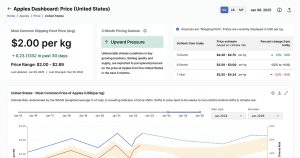The Supply Side: Helios AI to help Walmart with forecasting for agri commodities
by February 26, 2025 9:59 am 1,587 views

Helios AI announced it has signed on to help Walmart with enhanced price forecast tools for agricultural commodities. Helios and Walmart officials met as part of the retail giant’s Open Call for U.S. suppliers event last September.
Helios CEO Francisco Martin-Rayo said this past fall was the first time Walmart opened its Open Call for technology service providers. Martin-Rayo said the Virginia-based technology startup he co-founded was able to pitch to a cross-functional team at Walmart in September. He said Helios AI was the first tech service company to get a coveted “golden ticket.” He said the delayed announcement related to a software update recently completed on the firm’s forecasting tools that Walmart signed on to use.
Helios developed the in-house software to help food suppliers and manufacturers better understand risks to their supply chains. The AI technology provides price forecasting, including proprietary risk modeling that can predict large shifts in commodity prices months in advance.
“We provide commodity buyers and sourcing teams with everything they need to know about the growing season,” Martin-Rayo said. “Our AI platform tracks daily risks for 50 commodities, covering 90% of all the districts in the world. That means we can help predict significant price changes months in advance to alert our clients of any critical events affecting key export or production regions and factor in how climate is affecting each commodity growing season.”
As the country’s largest grocery retailer, Walmart sources commodity products worldwide at scale. Any disruption in the supply chain can cause a loss of sales and the retailer’s ability to serve its customers. Walmart invests in supply chain automation that uses AI to help transform its grocery network.

Martin-Rayo said the past three to five years have been some of the most challenging in terms of agricultural production because of climate volatility, geo-political conflicts and a pandemic. At the same time, AI technology applications have improved.
With more than 4,600 Walmart stores in the United States and thousands of product SKUs (stock-keeping units) needed daily, maintaining a sustainable, uninterrupted supply chain is a business imperative for the world’s largest retailer, noted Martin-Rayo. He said Helios will allow Walmart to evaluate medium- and long-term climate risks facing its global agricultural supply chain to secure sustainable sourcing.
“Walmart is leading the way when it comes to leveraging artificial intelligence to strengthen its supply chain,” he said. “Helios winning the ‘golden ticket’ is not only a great testament to our technology but also proof that there are urgent needs from procurement teams to climate-proof their supply chains — especially those at the most globalized levels.”
In tandem with the Walmart partnership, Helios AI also announced a new suite of features that will help agri-food procurement workers and supply chain managers make smarter, faster and more informed decisions.

He said the software allows customers to choose a unique time to measure, allowing them to analyze from one month up to two years. The analysis includes climate conditions such as days below freezing, excessive rain, drought and the number of days above 90 degrees. The insights make it easier to determine if crops are getting enough chill days, face a frost risk, or experience flooding.
Libby’s was one of the first test cases for Helios AI. He said Libby’s received the Helios report in August, which forecast significant rainfall in China for mandarins. Libby’s supply chain workers were trying to decide how much supply they should purchase and when they should make the purchase. He said they could buy early due to the risk or wait a few months when they require a purchase regardless of conditions and purchase prices. Libby’s decided to purchase 12 months of supply earlier than normal. Six weeks later, when they would have normally purchased the mandarins, the prices had risen.
“Thanks to Helios AI’s platform, we were able to predict the increase in mandarin orange prices six weeks before the market and buy a year’s worth of supply from our partners, saving us 15%,” said Chris Derose, president of Libby’s.
Helios AI has predicted in the past year a spike in cocoa prices around the world, a shortage of avocados in Peru, a reduced coffee supply in Vietnam, and a pumpkin shortage in the United Kingdom. Unexpected frost-like temperatures impacted flowering apricot trees from late November to early spring in Turkey. Helios detected this anomaly five months before media reports, allowing users to secure alternative suppliers before a 60% price surge.
Martin-Rayo said the food ecosystem is complicated because there are so many links in the supply chain, from the banana growers in Ecuador to mangoes in Peru to strawberries in California to the end consumers who are final purchasers. He said Helios works with the three to four links in the supply chain between the ends.
“We don’t work with growers or consumers, but we work with everyone else along the supply chain,” Martin-Rayo said.
He said the company will continue to improve the forecasting through AI for those who rely on agricultural commodities.
“I think it’s going to be a really tough 10 years in terms of geopolitical, climate and crop volatility we continue to see. We are going to need an increased level of support across the food supply chain to mitigate those risks for businesses and consumers. We are excited to support that with our technology platform,” Martin-Rayo said.
Editor’s note: The Supply Side section of Talk Business & Politics focuses on the companies, organizations, issues and individuals engaged in providing products and services to retailers. The Supply Side is managed by Talk Business & Politics, and is sponsored by HRG.
